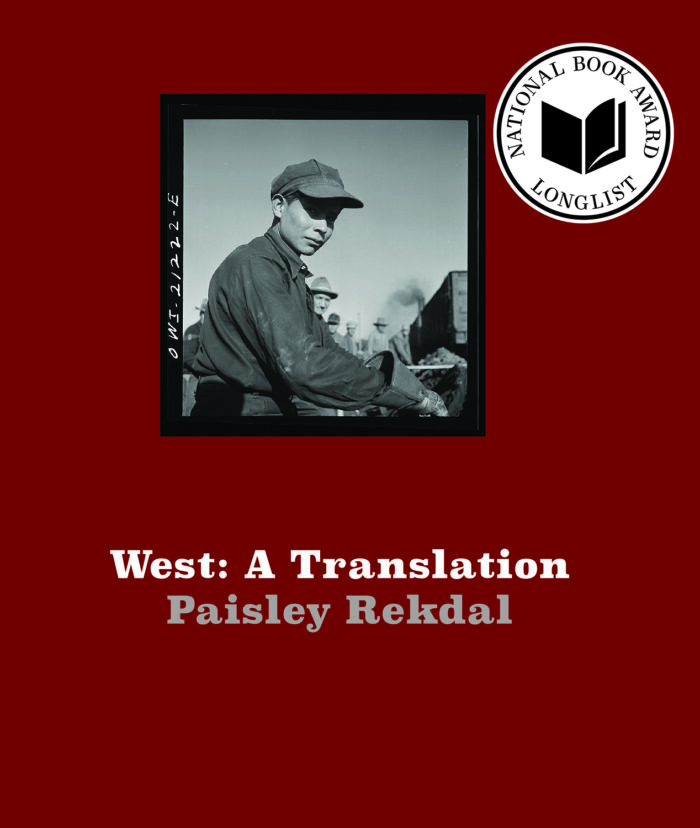
“Elegiac and shot through with righteous anger, this essential collection demands a national reckoning.”—Publishers Weekly, starred review
In 2018, Utah Poet Laureate Paisley Rekdal was commissioned to write a poem commemorating the 150th anniversary of the transcontinental railroad. The result is West: A Translation—an unflinching hybrid collection of poems and essays that draws a powerful, necessary connection between the railroad’s completion and the Chinese Exclusion Act (1882–1943). Carved into the walls of the Angel Island Immigration Station, where Chinese migrants to the United States were detained, is a poem elegizing a detainee who committed suicide. As West translates this anonymous Chinese elegy character by character, what’s left is a haunting narrative distilled through the history and lens of transcontinental railroad workers, and a sweeping exploration of the railroad’s cultural impact on America. Punctuated by historical images and told through multiple voices, languages, literary forms, and documents, West explores what unites and divides America, and how our ideas about American history creep forward, even as the nation itself constantly threatens to spiral back.
West is accompanied by a website (www.westtrain.org) that features video poems and encourages self-exploration of the transcontinental railroad’s history through an interactive, non-linear structure. Pairing this urgent book and innovative website, Rekdal masterfully challenges how histories themselves get written and disseminated. The result is a tour de force of resistance and resilience
ISBN: 9781556596568
Format: Paperback
回 / Return
If falling leaves return to roots, what grows
when leaves cannot be gathered?
What returns if not the body? What remains
if not the soul? Who is to say these graves
empty of their bones mean only loss, not
that these men escaped death’s hold entirely:
they are not home, but they are not here,
either, or have become so full of here
we need another word than gone. So throw
out the cormorant, its leg tied with silken ropes.
Let it drag the air for memory. Over and over,
as many times as you want. You can’t snare
what isn’t missing. This country claimed their bodies.
It never trapped their souls.
Reviews
2023 National Book Award, Longlist
“An illuminating book by Utah’s former poet laureate Paisley Rekdal that commemorates the 150th anniversary of the transcontinental railroad. Asian, Irish and African American workers’ voices are brought into heightened relief in this collection, as Rekdal asks the question, ‘Is American history forward, progressive, recursive, or is it spiraling?'” —Terry Tempest Williams, New York Times
“A fluid, striking blend of poetry and essay that limns the railroad workers, the treatment of Chinese immigrants, environmental devastation, and the fate of immigrants everywhere: ‘What is freedom/ but the power to choose/ where you won’t die?'”—Barbara Hoffert, Library Journal, Best Poetry of 2023
“The powerful latest poetry and essay collection by Utah poet laureate Rekdal tells the story of the transcontinental railroad through the voices of the workers who built it. . . . Each piece offers a unique and evocative perspective, portraying migrant workers, railroad tycoons, labor activists, and politicians, among many others. . . . There is an accompanying website with companion videos and audio to enhance an already immersive and stunning collection. A must-have for libraries.”—Booklist, STARRED review
“Through these poems, readers are asked to wrestle with the complex, layered histories of race, creed, class, and gender that are all too often overlooked in monolithic presentations of America’s past and present. Elegiac and shot through with righteous anger, this essential collection demands a national reckoning.”—Publishers Weekly, STARRED review
“Paisley Rekdal has always been a breathtakingly ambitious poet, and this is her most ambitious book so far – a work of seamlessly blended poetry and history. In lyric poems in many forms and spoken through many voices, as well as in corresponding essays, Rekdal traces and grieves the sorrowful politics that link the building of the transcontinental railroad and the Chinese Exclusion Act of 1882 (‘Congress had to pass an act/ to make the building stop’). She excavates an American shame that has yet to be reckoned with, though this extraordinary book, which finds a fresh purpose for poetry as a reliquary of evidence, perhaps makes a start.”—Craig Morgan Teicher, NPR “Books We Love 2023”
“A captivating, extensively researched book blending poetry and essays, told from the perspective of the railroad workers while focusing on the lives and treatment of Chinese migrants and the devastation to the environment during the building process. . . . A remarkable collection offering history not typically told in textbooks.”—Library Journal
“Part oral history, part ‘translation,’ in which [Rekdal] turns the American sentence into a document of witness.”—Diane Mehta, Electric Lit
“Rekdal forges a meaningful intersection of translation and documentary poetics. Rekdal’s essays and the companion website further contextualize and complicate, but it is the poems themselves that reveal the magnitude of this history.”—Rebecca Morgan Frank, Harriet Books at the Poetry Foundation
“Reflects on American unity and division in poems that adopt multiple voices, languages, and forms and are juxtaposed with historical images.”—Publishers Weekly, Spring 2023 Announcements
“Rekdal mixes the documentary and the speculative to assemble a wide range of histories that originated in the transcontinental railroad. Another way of saying this is that Rekdal deploys the formal techniques of appropriation, collage, and speculation to translate the silences of the archive. . . . In a sense, West is a book of ghosts—not the white-sheeted apparitions of the popular imagination but specters of the past that flicker imperceptibly in the present, shaping our lives in ways we cannot grapple with until we recognize them.”—Teow Lim Goh, Los Angeles Review of Books
“An unflinching archival masterpiece.”—Justine Chan, International Examiner
“A daring and serious attempt to move from a work of online art to a book, pushing at the inherited limitations of both.”—Jesse Nathan, McSweeney’s
“Braiding personal and political histories, Rekdal brings in the voices of Irish and Chinese workers alike—along with railroad company owners, law enforcers, newspaper correspondents, immigration officers and legislators. By representing the communities and interests of the era as characters within a narrative, she encourages her readers to engage with history at a personal level.”—Aditi Bhattacharjee, Public Seminar
“In West, Rekdal elaborately translates an elegy carved into a wall at Angel Island Immigration Station (where at least five hundred thousand Chinese migrants were detained between 1910–1940) through poetry, essay, video, and fragments of historical records to offer a complex and nuanced portrait of the American West. As much a research project as a work of literature, West reveals the layered histories and overlapping narratives of the region and its peoples. For Paisley, the triumphalism that marked the railroad’s construction often overshadows the histories of violence, exploitation, and discrimination that continue to reverberate into the present day.”—Kenneth Tam, BOMB
“Astonishing in scope and intelligence, its ambitions are as vast as the nineteenth-century frontier and the dreams for American empire. West is Rekdal’s eleventh book, and it is nothing less than an extraordinary explication of what it means, and what it costs, to document history.”—Lynnell Edwardss, Good River Review
